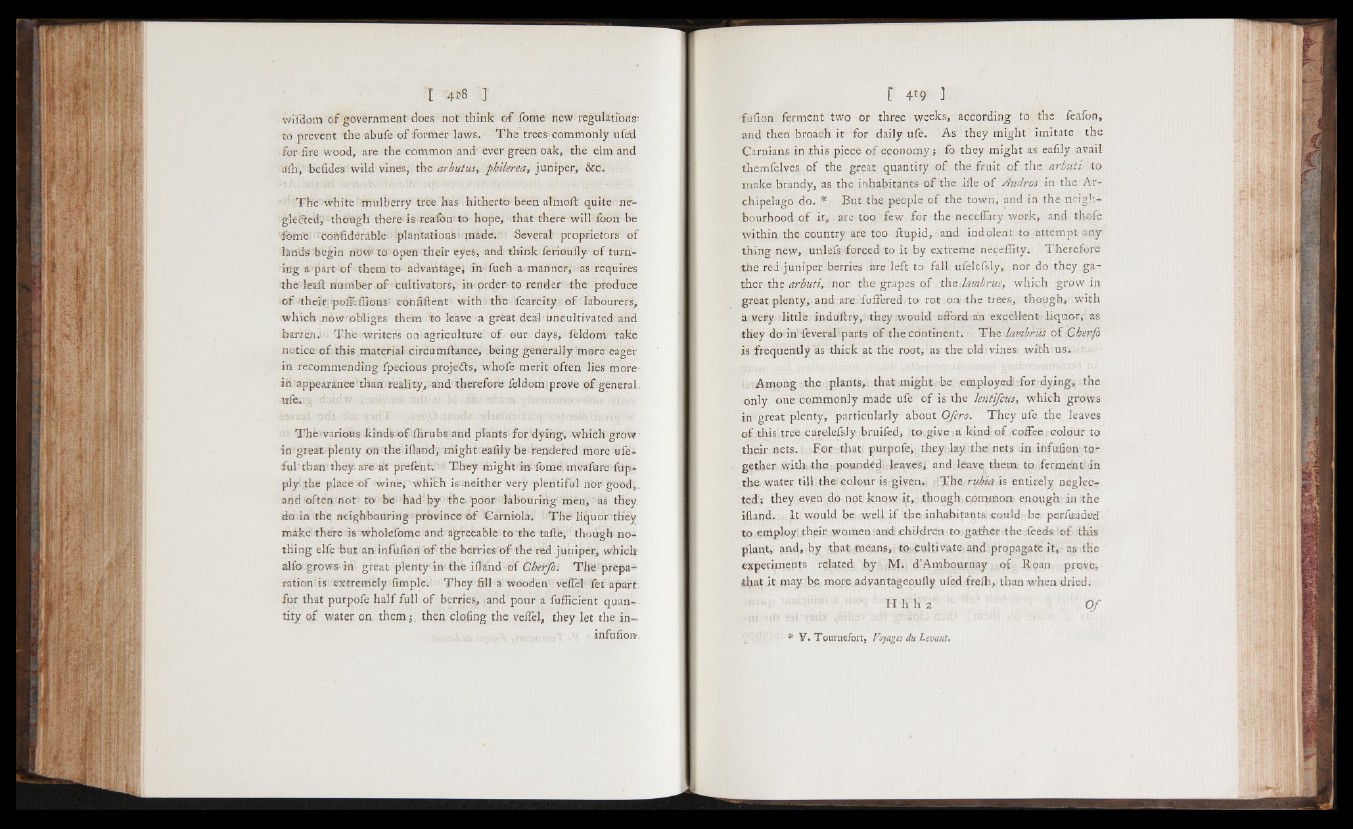
wifdom o f government does not think o f fome new regulations
to prevent the abufe o f former laws. The trees commonly ufed
for fire wood, are the common and'ever green oak, the elm and
aih, befides wild vines, the arbutus, philerea, juniper, &c.
The white 'mulberry tree has hkherta been almoft quite ne-
glefted, though there is reafon to hope, that there will foon be
feme coMiderable plantations-made.c Several proprietors of
lands begin nOw* to open their eyes, and think ferioufly o f turning
a part of them to advantage, in fueh a-manner, as requires
the leaf! number of cultivators, in-order to render the produce
o f their pefftffions1 confident with the fcarcity of labourers,
which now obliges them to leave a great deal uncultivated and
barren; The writers on agriculture o f our days, feldom take
notice o f this material circumllance, being generally more eager
in recommending fpecious projefts, whofe merit often lies more-
in appearance than reality, and therefore ieldom prove o f general,
tile.
The various kinds of ihrubs and plants for dying, which grow
in great plenty on the iiland, might eafily be rendered more ufe-
ful than they, are at prefenti' ■ They might in- fomemeafure fup-
ply the place o f wine, which is ¡neither very plentiful nor good,,
and often not to be had by the poor labouring men, as they
do in the neighbouring province-of Garniola; The liquor they
make there is wholefome and agreeable to the tafte, though nothing
elfe but an infufion o f the berriesof the red juniper, which
alio grows-in great plenty in the iiland of Cherfo, The preparation
is extremely fimple. They fill a wooden veifel fet apart
for that purpofe half full o f berries, and pour a fufficient quantity
o f water on them,, then clofing the veifel, they let the in -
infufion.
fufion ferment two or three weeks, according to the feafon,
and then broach it for daily ufe. As they might imitate the
Carnians in this piece of economy; fo they might as eafily avail
themfelves o f the great quantity o f the fruit o f the arbuti to
make brandy, as the inhabitants o f the iile o f Andros in the Archipelago
do. * But the people o f the town, and in the neighbourhood
of it, are too few for the neceifary work, and thofe
within the country are too ftupid, and indolent to attempt any
thing new, unlefs forced to it by extreme neceflity. Therefore
the red juniper berries are left to fall ufelefsly, nor do they gather
the arbuti, nor the grapes o f the lambrus, which grow in
great plenty, and-are fuffered to rot on the trees, though, with
a very little induftry, they would afford an excellent liquor, as
they do in feveraf parts o f the continent. The lambtus of Cherfo
is frequently as thick at the root, as; the old vines with us; . ¡5
Among the plants, that might be. employed for dying, the
only one commonly made ufe of is the lentifcus, which grows
in great plenty, particularly about Ofero. They ufe the leaves
o f this.tree carelefsly bruifed, to give a kind o f coffee colour to
their nets. For that purpofe, they Jay the; nets in infufion together
with the pounded leaves; and leave them to ferment in
the water till the? colour is given.. The rubia is entirely neglected;
they even do not know it, though common enough in the
iiland. It would be well i f the inhabitants could be perfuaded
to employ their women and children'to*gather the feeds ¡of this
plant, and, by that means, to-cultivate and propagate it, as the
experiments related by M. d’Ambournay of Roan prove,
that it may be more advantageouily uied freib, than when dried.
H h h 2 O f
* V. Tournefort, Voyages du Levant»